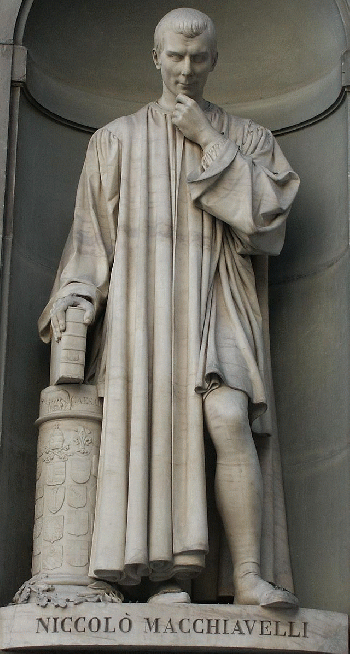
Niccolo Machiavelli
(Image by (From Wikimedia) The original uploader was Frieda at Italian Wikipedia, Author: See Source) Details Source DMCA
[How fitting that this section of the longer series on Machiavelli is posted on the day of the Electoral College vote.]
The Powers of Religion in Civic Affairs
A summary of Discourses 11-- 15
" Men are born, live, and die in an order that is always the same." Discourse 11
The virtues of a great leader die with him, and his successors often lack those virtues. Therefore, if a free government is to be successfully maintained, there has to be a structure based in legal morality. This is usually derived from the common religious morality of the base culture. Religious belief is a necessary base for maintaining a culture and government.
A fear of a God (or Gods) generally keeps people honest. The corruption in the Catholic Church in Italy of the 1500s weakened the city states and hurt everyone. In the Roman Republic, the minds of the Gods were interpreted through oracles, soothsayers, and diviners. They were generally believed by the citizens and manipulated by the people in power. A proper and purposeful interpretation of the Will of God or Gods is more important in maintaining unity and order than an overly academic interpretation of a uniform ethical code unresponsive to current events.
For a deeply religious population, the use of omens and auspices can provide the needed confidence to be successful in a venture. In Rome, when hens were put out and they pecked, the venture would be successful. If the hens failed to peck the omens were against success and the venture was better postponed.
However, in cultures where religion is a secondary concern, religion tend to be ignored, until there is an extreme emergency. When everything else has failed, the leaders and population turn to their religious leaders and rituals for help.
Contemporary Reflections:
Machiavelli believed that religion in both Rome and his Italy formed the basis for cultural unity. For both, the danger was the corruption of religion. Cultural unity in the United States comes from a belief in personal freedom in a Democracy. Our unity is in danger from corruption.
The United States was founded on a common Protestant Christian ethic that was reflected in English Common Law and embedded in the Constitution and Bill of Rights. The Protestant ethic centered around a moral code that included: trust in God and neighbor, honesty, loyalty, responsibility, self reliance, and working hard. At that time, people had to be Christian although there was a strong prejudice against Roman Catholics.
In the United States today, there is a great diversity in religious congregations: traditional Protestant Christians, Roman and Orthodox Catholics, Fundamentalist Christians, Jews, Muslims, Buddhists, Baha'i, unaffiliated agnostics, Sikhs, Wicca, and scientific atheists, among others. Our nation cannot count on religion to provide unity or order so it looks to the banner of civil democracy to provide for unity and order.
This works so long as the Protestant ethic remains active in governmental leadership and the general population. However, like the corruption in the Roman Catholic Church of the 15th and 16th Centuries in Italy, secular corruption has increased to a point where the ethical priorities of the founding documents are seriously eroded and distorted.
Interpretations of the Constitution by the Supreme Court have allowed the aristocracy to take control over the presidency and both houses of the congress, thus bringing corruption into all the federal departments and moving stealthily to infect all 50 of the state legislatures.
(Note: You can view every article as one long page if you sign up as an Advocate Member, or higher).




